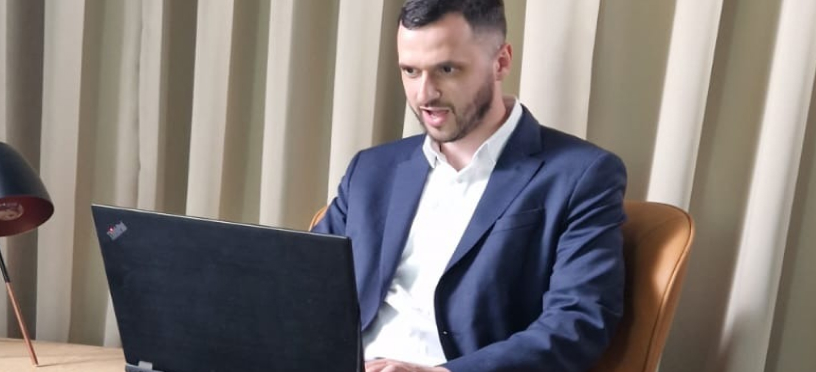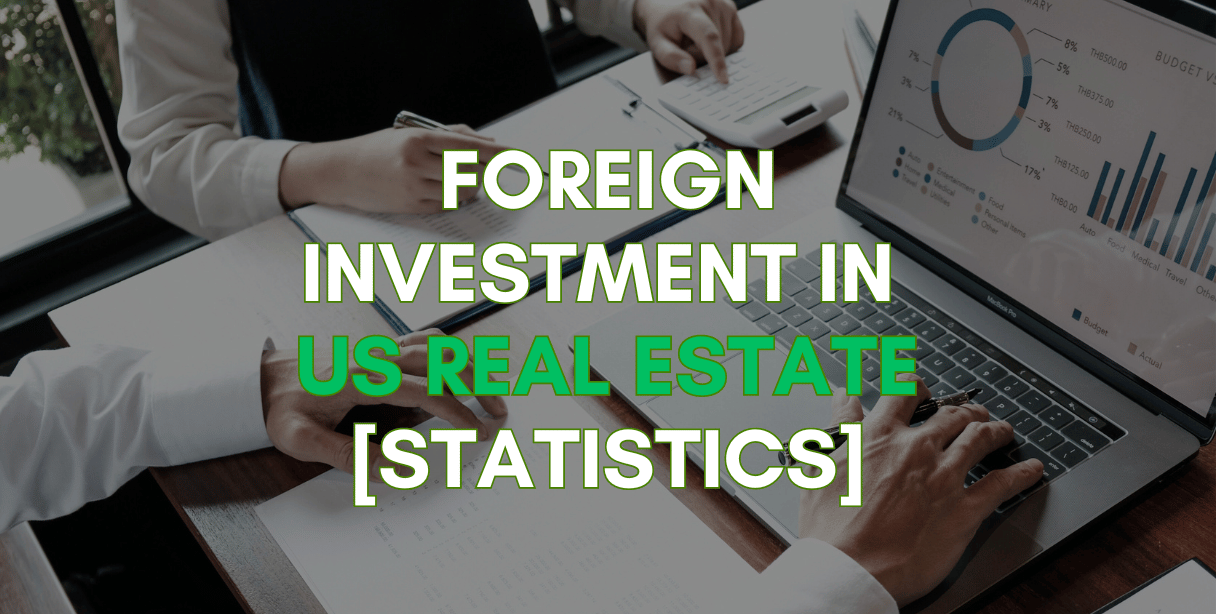Everything Nonresidents Need to Know Before Entering the US Real Estate Market
Investing in the US real estate market is at an all-time high, at least when it comes to foreign investors. Therefore, if you’re thinking of pulling the trigger and buying a property in the States, our foreign investor guide can be helpful.
Investing as a foreign buyer isn’t without its disadvantages. Real estate, in general, is a risky game, just like any other investment. However, arming yourself with knowledge, doing due diligence, and seeking advice from people who know more than you do will lower that risk. The US real estate market has been historically the safest and smartest investment opportunity, even in these unstable times we live in. Read our foreign investing statistics in US real estate to get a bigger picture.
If you’re considering investing in the US real estate market, here are some things you need to know.

Foreign Investor Guide | US the Land of Opportunity
Foreign investors love the US real estate market because the States really are the land of opportunity. Owning property sits at the very core of the ever-so-famous American Dream. The US real estate market actively fuels that dream by being an open and liberal one, which means that anyone can invest in it.
Apart from buying into the American Dream, the US real estate market, along with the laws, gives investors relatively stable and safe investment opportunities.
- Stable and secure investments in a market that’s on the rise
You can expect substantial capital appreciation when you invest in the US real estate market. Ten years ago, the US real estate market was trying to mend itself after the 2008 recession. One can say that it did so marvelously, given that today, the median home value is 89.1% higher than it was back then. What’s more, it’s also continually on the rise.
Over the past three years, we’ve seen a fast growth in home prices, thanks to the pandemic. The average house in the US was valued at 41.1% more than before the pandemic.
In the past year alone, housing prices have gone up by 14.9%. The factors that contributed to this rise are still in play. What’s more, the relations between supply and demand are still at the same standstill as the previous year. Therefore, it’s logical to expect that the prices will continue to go up.
Of course, the prices won’t continue this unprecedented growth. In July of 2022, housing prices fell for the first time in 10 years (by 0.1%). However, the younger generation is ready (and willing) to enter the housing market for the first time. Therefore, it’s expected that the prices will continue to have positive growth. That growth will, however, have a slower pace than we’ve seen in the previous three years.
- Positive cash flow
One of the most significant incentives for investing in the States is the positive cash flow. The prices of rent all across the US continue to grow. It’s expected that the year-over-year growth of rental prices will go from the already-high 5.8% to a whopping 8.4% in the first half of 2023.
Therefore, it’s logical to expect a positive cash flow from your future rental properties. All you have to do is set up your property for renting and manage it like a proper landlord.

- Capital tax deferral
The whole ordeal of paying taxes in the US might seem a bit convoluted. That’s especially true for someone who’s never partaken in the tax system. However, there are significant advantages that foreign buyers have.
For example, if you invest in Qualified Opportunity Zones (QOZs), there are significant capital gain tax incentives that you can take advantage of. Furthermore, you can also take advantage of the tax deductions that you, as a non-US homeowner who rents out their home, are entitled to. These deductions will significantly lower your taxes.
You can do that by electing to connect the income you get from your property (the rent you’ll be getting) to a trade or a business in the United States. Once you do this, you’ll be able to claim deductibles to the income. You’ll also be able to tax your net income at graduated rates. All of this will result in significantly lower annual taxes for your new property.
- Mortgage loan financing
Even if you don’t have a credit score, you can still secure financing for your real estate investment. Of course, this process includes quite a few steps (opening an LLC, building up your credit history with your ITIN, taking advantage of good and bad debt, etc.)
- A liberal market
One of the most significant advantages of the US real estate market, as mentioned, is that it’s completely liberal. That means that you, a foreign investor, can buy pretty much any property you set your sights on.
The only exception is agricultural land. However, that exception only exists in six specific states — Minnesota, Mississippi, Hawaii, Oklahoma, Iowa, and North Dakota.

The Advantages of Not Putting All Your Eggs In One Basket
If you’ve been investing for a while, then you’re probably intimately familiar with the term “investment diversification.”
This technique protects investors from risks and losses. You diversify your investments or, in simpler terms, make sure you are investing in various industries and categories and by using different financial instruments. That way, you minimize your losses in case of a catastrophe or simply poor market conditions.
When something happens that shakes the global economy (like a global pandemic, for example), your investments suffer. However, not all investments will suffer in the same way. What’s more, some of them might not suffer at all.
Distinct industries and areas react differently to the same event. In other words, in order to protect yourself from great loss, you need to not have all your eggs in one basket.
A good rule of thumb when it comes to investments is that you should:
- invest in various market sections;
- pick companies of different sizes;
- invest in both international and domestic companies.
This same rule can be applied to investing in real estate. That’s exactly why it’s an excellent idea to invest internationally. And which market could possibly be better than the US one?
The Importance of Having a Plan B
Aside from offering you a great way to diversify your investment portfolio, investing in US real estate also allows you to have a stellar plan B.
Having a plan B is a vital part of an agile investment strategy. It allows you to adapt and adjust in case of unexpected events. For example, as an investor, you need to expect and prepare for market fluctuations, tax charges and changes, as well as inflation.
However, some things we simply can’t foresee. But just because we can’t see them coming doesn’t mean we can’t be prepared for them (in a way).
Investing in the States can be your plan B. In case of (another) global catastrophe, for example, owning a property in the US can be your saving grace. It can be a source of income in unstable times or even a safe haven.
The States are historically one of the most socially and economically stable countries in the world. What’s more, the States also have an uncanny ability to bounce back from economic instability. These factors, along with the fact that it’s a politically stable and conflict-free country, drive foreigners to invest in it.
Being an agile investor means making smart moves that will prepare you for every possible scenario. If you stem from a country that can’t offer the same stability that the US can, having an investment in the US seems like a smart plan. Just in case.

Location, Location, Location
When it comes to picking the location for your next investment in the States, you might find it hard to choose. Why? Because the States are a unique country when it comes to urban growth.
The States are the only country in the world that has moderate growth. Most other countries, those that are well-developed and those that are up-and-comers, so to say, have a few cities and metropolises that are the logical pick when it comes to investments.
So, for example, if you want to invest in Japan’s real estate market, you’ll buy a condo in Tokyo or a house in Kyoto. If you’re more of a Latin America type of investor, you’ll go to Mexico and invest in Mexico City or to Brazil and invest in Rio de Janeiro.
Why? Because those are the cities with the biggest urban growth. People are flocking to them, fighting for a chance to live and work in them. That means that’s where the profit opportunities are.
You won’t buy a property in Middle-Of-Nowhere, Mexico, because you know that renting it out will probably be an ordeal. You’ll have trouble keeping tenants (if you ever find any) because the younger generation is moving to more urbanized areas.
The Glory Of Moderate Growth
The States are full of well-developed cities that continue the upward trajectory of their urban crawl.
Therefore, making the choice of where to invest is not an easy one. Do you pick the most obvious ones, like Chicago, New York, and Boston? Or do you opt for one of those that is still developing? Perhaps you can pick a couple to invest in?
There are clear answers to these questions, which come after years of experience in investing. Ideally, you want to invest in one area alone because you can develop your contact network there. Our founder, Luka, picked Milwaukee for his first property investments and continued to invest there thanks to the network of experts and contacts he formed over time, which proved to be invaluable later.
The fact that you can literally choose where to invest in the States also gives you the opportunity to follow the money. For example, you can turn your investment into a real money-maker by purchasing a property somewhere with high rental prices while continuing to live somewhere where the cost of living is low.
That will ensure that your property generates high profit, which you can save up and invest further, thus building your own little enterprise.

Securing a Better Future: Green Card Opportunities
Let’s make one thing clear — purchasing a property in the States won’t automatically put you on the path of obtaining a green card. As mentioned, the US real estate market is completely open. Foreigners can freely purchase properties all over the country. And, of course, not all of them can (or want to) obtain green cards.
However, investing in real estate can help you get a green card through the EB-5 immigrant investor program. Keep in mind that you can’t enter a program just by simply investing in US real estate. To be eligible for a visa through investing, you have to:
- Invest in opportunities that are a part of regional centers
- Make an investment of at least $900,000 in a rural area (that has a high unemployment rate) or $1.8 million in an urban area
- Create (or preserve) at least ten full-time jobs thanks to your investment
Once you do that, you can apply for a green card as an investor.
And Accumulating Generational Wealth
So, investing in the US real estate market gives you an opportunity to secure a better future for yourself and your family. However, it also gives you an opportunity to accumulate generational wealth.
For example, your investment can serve as a passive income stream until your kids are of college age. Then, it can be their residence until they complete their higher education and get on their feet (both financially and socially). Afterward, it can become a stream of passive income again until, finally, both the property and the LLC that you’ll open in order to acquire it will be inherited by your children.
Therefore, the moves you make today on the real estate market will benefit not only you but your heirs as well.

The Disadvantages That Nonresident Investors Face
Of course, as much as investing in US real estate can prove to be profitable for many, it doesn’t come without its disadvantages.
Generally speaking, a person who tries to walk through the convoluted process of buying a property in the US as a nonresident is in for an uphill climb. Our founder, Luka, spent hundreds of hours pouring over different materials like books, laws, and advice pages and spent thousands of dollars on advice from various experts (and “experts”) in order to be able to walk out the other end with a couple of properties in his investment portfolio.
The NRI consulting agency exists because that accumulated knowledge is invaluable. Having not only the proper knowledge but also the right guidance can turn the difficult process of purchasing a property in the US from a hellish nightmare into a walk in the park.
But what exactly makes it so hellish?
It’s a Complex Process
If you think that just because the US real estate market is an open one, you can simply swoop in and buy a property, you’re in for a rude awakening. The process of purchasing a property starts well before you find a good deal.
In order to be able to sign your name on a property deal and actually see some profit from it, you first need to:
- open a US bank account
- open a company in your name (most likely an LLC)
- secure financing
- figure out, plan, and file taxes
- find a good (preferably off-market) deal
- consult a real estate expert
- do a home inspection
- close the deal
- renovate the property
- rent out the property
- manage your property
All of these steps require you to consult at least one expert or read through pages and pages of laws and regulations.

The Laws Are Confusing (And You’re Not Familiar With Them)
And, speaking of the laws, the US laws tend to be quite convoluted. They are written in a way that’s difficult to understand for anyone, let alone someone who’s never had to deal with them in the past (due to not being a US citizen).
The biggest problem is that there’s no one, unique law that regulates foreign investors and their rights and obligations when it comes to purchasing real estate in the US. Therefore, the information that you’ll need (about pretty much anything) can’t all be found in one place.
Instead, you’ll have to pour over various books, government pages, and advice blogs, as well as contact lawyers and accountants to get the info you need.
Alternatively, a full-cycle agency, like the Nonresident Investor, can provide you not only with all the information you need but also with guidance that will make this whole process seem like a piece of cake. Our team of resident experts, as well as a network of trusted and capable connections, make navigating the market much easier.
Finding Off-Market Deals Can Be Difficult
One of the best ways to invest in real estate is to find a good off-market deal. Off-market deals offer several benefits:
- The owners usually aren’t in a rush to sell, which means that you can take your time inspecting and assessing the property.
- Off-market deals aren’t accessible to the public, which means your competition for them won’t be as stiff. Remember, homes sell like hotcakes these days, especially in big, urban areas. Last year, more than 60% of homes were sold over the asking price. That means that people are desperate to buy.
- You can negotiate when it comes to the price. Now, while this isn’t a rule, off-market deals tend to have flexible prices.
Clearly, finding a good off-market deal can increase your profit. However, finding one when you aren’t physically there to look for one (or snatch one up as soon as it pops up) is quite difficult. What’s more, not being physically present can lead to many missed opportunities.
It’s also quite hard to find an off-market deal when you have no connections. Having lawyers, accountants, real estate agents and advisors, developers, lenders, and other experts you can consult is a huge advantage when it comes to making an investment. As a nonresident investor, those connections probably escape you.
That’s where the NRI team can help the most. Our well-developed network of people can help you not only find the best off-market deal but also close it and maintain the property in order to ensure the best possible ROI.

Faulty Deals, Fraudulent Papers, And Lying Owners
Aside from not having access to some deals, not being physically present also means that you can’t make a deal in person. Not being able to talk to the owners, check out the paperwork for the property, and inspect the property itself can lead to quite a few problems.
First of all, there are higher chances of getting duped when you’re a nonresident investor making a purchase online. Although it’s much easier to do everything online, doing so leaves you more open to scams.
For example, there’s a higher chance of you buying a house that needs more work than you initially thought or that has unclean papers or multiple owners. Signing an operations agreement on a house like that leaves you with a huge bureaucratic mess that you have to work through yourself.
The Issues of Financing (And Taxes)
If you have cash in hand, then financing your first US real estate purchase won’t be difficult.
However, if you don’t, then you’ll probably need to secure financing through the US financial system.
US citizens can secure housing loans easily. You, however, can’t. As a nonresident, you’ll likely have to utilize non-conforming loans. These loans aren’t like the Freddie Mac and Fannie Mae loans that finance the entire homeowner body of the USA. Instead, these loans come at a higher interest rate and generally require a higher downpayment.
Also, securing financing will take longer for nonresidents.
Taxes are also something you’ll have to think about. As mentioned, as a nonresident, you are entitled to quite a few tax benefits. However, finding your way through the system and properly filing taxes for your purchase (and filing annual taxes every year after that), can be quite tricky.

Long-Distance Property Management Isn’t for Everyone
Finally, one of the biggest drawbacks of nonresident investments is property management. Although not all foreign investors buy US properties in order to secure a steady stream of passive income, those that do often find themselves in a bit of a pickle when it comes to property management.
It’s important to understand that issues with renovating the property and renting it out come with the territory. Expecting to find a good deal, close it, and magically have a stream of income from the property is ludicrous.
Navigating property renovations and finding tenants when you’re not physically there isn’t easy. However, it also isn’t impossible. It requires some elbow grease and lowering of your expectations. Once you do that, you’ll have a cushy passive income to enjoy every month!
NRI: A One-Stop-Shop for All Your Needs
All of the downfalls of investing in US real estate might seem too big to handle. But that’s precisely why we started the NRI brand! With our guidance, you’ll save both time and money!
As a full-cycle consulting agency, we offer help to nonresident investors every step of the way. Our team of experts and a network of contacts can easily mitigate all the downfalls that might seem like dealbreakers to you now.
We’ll:
- help you by answering the seemingly endless list of questions that you must have;
- provide assistance with opening an LLC and a bank account;
- help you plan and file taxes
- find a good deal and help you close it;
- and, depending on which NRI package you opt for, we can even help you optimize your ROI, manage your property, and deal with tedious paperwork like annual taxes.
Navigating the muddy waters of the US real estate market isn’t easy, but it can be!
Find Out How
Book a free 15-minute consultation with our founder!




